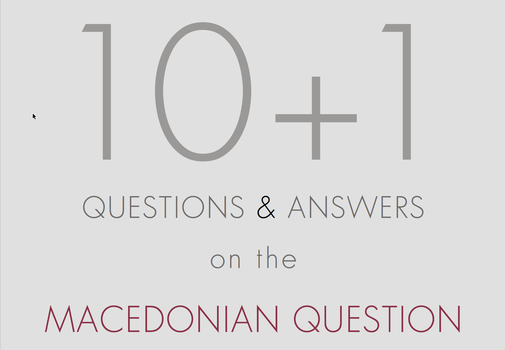
All criticisms aside, the recent referendum in the Former Yugoslav Republic of Macedonia (FYROM) marked a watershed moment in relations between Macedonia and Greece, which have historically been hostile largely based on the latter’s unwillingness to accept the former’s chosen name. 10 + 1 Questions & Answers on the Macedonia Question, a new book translated into English with support from the Rosa-Luxemburg-Stiftung's Athens office, introduces English-speaking readers to the “why” of Greek reactions to the Macedonian referendum and the myths that inundate the Greek side, haunting the past and raising concerns about the present and future.
History unfortunately does not teach – all serious historians accept this – so people and nations are forced to live with their mistakes and passions. If at some point they manage to distance themselves from those mistakes and passions and reflect in a self-critical way, then we can hope that the pages of miscommunication will be replaced by a better story. That is the story that this book wishes to serve for the relationship between the two states.
The book was originally written in Greek at a critical moment in spring 2018 when negotiations between Greece and FYROM were portrayed as “frozen”. It was written in the heat of the moment and aimed to show that there is a current of critical thought in Greek society that, since the 1990s, has resisted the nationalist frenzy and latent and explicit racism towards the “Skopje statelet”. Many feared that the vicious nationalism of the 1990s would return. But they were wrong: Greek society showed that it had changed. The nationalist rallies could not overturn the negotiations, few turned up and, most of all, they showed the political and actual inadequacy of the position that continues to deny reality: the reality that it is not possible in the 21st century for a society to deny another its right to self-determination.
This short book was written in question and answer format, and is intended for anyone concerned with the infamous Macedonian question. It provides a codified and critical tour of the most widespread positions that compose the grand national narratives in Greece, and offers a response. Yet it also seeks to spark a dialogue with those who wish to challenge their own myths, who feel that the stereotypical repetition of the slogan “Macedonia is Greek” merely prolongs the impasse in the relations between the two states. It thus written in the style in which the authors speak: simply, and not strictly scientifically – and definitely not quasi-scientifically. This book is not addressed to the few or to experts.
Dimitris Christopoulos is a Professor of Comparative Politics in the Department of Political Science and History at Panteion University in Athens, where he has taught since 2000. Kostis Karpozilos is a historian and the director of the Contemporary Social History Archives (ASKI). Originally published in Greek, 10 + 1 Questions & Answers on the Macedonian Question was translated into English by Michael Webber and released as an English-language e-book by the Rosa-Luxemburg-Stiftung Office in Greece.